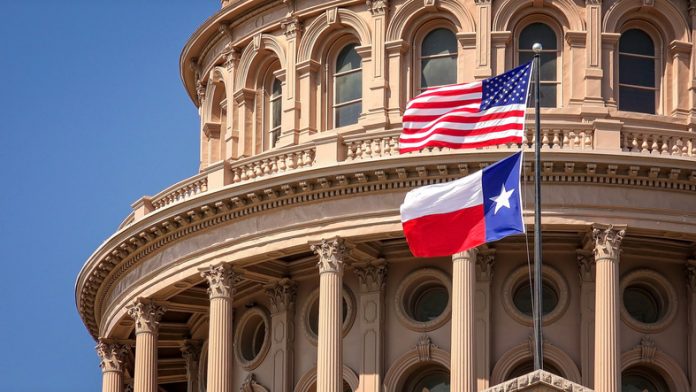The legislation is expected to save 5.72 million Texas homestead owners an average of $798 a year.
(The Center Square) – Three property tax reform bills unanimously passed the Texas Senate and are in the House.
They were among 30 bills prioritized by Lt. Gov. Dan Patrick. When introducing his legislative priorities last month, Patrick said most of the bills he supported “will pass with bipartisan support.”
All three property tax bills and a joint resolution proposing a constitutional amendment including the property tax measures received unanimous bipartisan support.
The property tax reform package was spearheaded by Sen. Paul Bettencourt, R-Houston, who said, “I’ve been working with Lt. Governor Patrick for 20 years and never thought I would be passing $16.5 billion of property tax relief in a single day. It’s unprecedented.”
Two bills and a joint resolution were filed by Bettencourt, SB 3, SB 4 and SJR 3. All were bipartisan measures with multiple cosponsors.
If it passes in the House and is signed by Gov. Greg Abbott, SB 3 would amend the tax code to increase the homestead exemption from $40,000 to $70,000 and gives seniors and disabled Texans an additional $30,000 deduction, or a total of $100,000, from the appraised value of their home.
SB 3 is expected to save 5.72 million Texas homestead owners an average of $798 a year. [Ed. correction] It’s expected to save over two million homestead owners who are over age 65 and who are disabled at least $1,062 a year, Bettencourt said in a press release.
SB 4 would allocate “an additional $5.38+ billion in ISD tax rate compression and will reduce recapture by expanding the school finance band to 20%,” Bettencourt said. “Rate compression benefits all taxpayers and reduces recapture by funding additional Maximum Compressed Rate (MCR) compression in school finance formulas. Expanding the school finance equity band will allow school districts to reduce their M&O tax rate further.”
Texas Taxpayers and Research Association President Dale Craymer said the plan “provides balanced relief for all taxpayers – rate compression obviously benefits all taxpayers.”
When discussing the bills in the Senate, Sen. Nathan Johnson, D-Dallas, said, “the economy’s doing great, our revenues are great, and we actually have reason to think that they’ll be pretty good, if not even better than pretty good, next session. But in two sessions, if we run into a deficit, what do we do about this commitment? Do we raise sales taxes, do we cut education, do we pull it out of the ESF, what do we do?”
Bettencourt replied, “What we do with this commitment is we honor it. That’s the bottom line.”
“But those are the questions we’re going to have to confront if we hit a deficit,” Johnson added, to which Bettencourt replied, “I think that in the foreseeable future, I would say probably for four years, I don’t see any possibility of that. Texas is too much of the job creation engine. We’ve got, you know, very rapid sales tax increases. I think that in the foreseeable future we will be, but I can’t disagree that someday there will be a crisis at some point and time maybe. But we’ve made this commitment, and we, and when you make a commitment, to the taxpayers, because it’s their money, see that’s what this all is about.
“You know, we talk about tax relief but they, somebody had to pay it first. So, with the exemptions, we’re doing great things, which is, we’re letting that money stay in the taxpayers, you know, wallets, pocketbooks, purses, whatever, checking accounts, online, and here we re’ making commitment that once we make it, we have to stand to it.”
Johnson agreed, adding, “We’re doing something that provides genuine tax relief,” saying, it’s “important.”
The Senate also unanimously passed SB 5, filed by Sen. Tan Parker, R-Flower Mound, which would amend the tax code to create an Inventory Tax Credit totaling $1.275 billion. The new franchise tax credit allows up to 20% “of the amount of ad valorem taxes paid by the entity during the period on which the report is based that are derived from the taxable value of the inventory owned by the entity,” according to the bill language.
The bill also raises the Business Personal Property Exemption to $25,000.
“Small businesses are the bedrock of our economy, and they have been hit hard by record inflation,” Parker said. “SB 5 will provide meaningful tax relief for businesses across Texas, helping them stay afloat, creating more job opportunities for Texans, and keeping Texas a competitive global player as the 8th largest economy in the world.”
The Senate also passed a joint resolution, SJR 3, creating a constitutional amendment encompassing the proposals of SB 3, SB 4 and SB 5. If the legislature passes it, the resolution would become a ballot initiative that voters would approve or reject in the November 2023 general election.
The bills and resolution were received in the House on Thursday and haven’t yet been assigned to committees.
Originally published by the Center Square. Republished with permission.
For more from Budget & Tax News.
For more public policy from The Heartland Institute.











